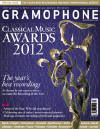Texte paru dans: / Appeared in:
*

GRAMOPHONE (Awards issue - 2012)
Pour s'abonner /
Subscription information
Sony
88691963952

0886919639520 (ID254)
Reviewer: Richard Wigmore
Castrato arias excavated by Sony’s star soprano Kermes
A flamboyant star in her native Gerrnany, Simone Kermes is a dangerous, no-holds barred singer. Like Cecilia Bartoli, whom she often resembles, she specialises in ferreting out unknown castrato arias. They don’t come much more unknown than the disc’s opening number, a swaggering, trumpet-festooned call to arms written for the great, if (to colleagues) insufferable Caffarelli by the Neapolitan Giuseppe de Majo. Kermes’s voice is hardly conventionally beautiful. But here, and in a clutch of tempestuous arias by Porpora (Handel’s rival in London in the mid-1730s), Leo and Pergolesi, she thrills with her fearless attack and coruscating coloratura. For vocal athleticism it would be hard to beat Porpora’s frenetic ‘Empi, se mal disciolgo’, despatched by Kermes with her controlled recklessness, biting into the words and, typically, using her own embellishments in the da capo to heighten the expression of vengeful fury.
In reflective music Kermes is more controversial. Handel’s ‘Lascia ch’io pianga’ — the sole familiar number here — is touching in its inwardness. Elsewhere, as in a rapt invocation to Jove from Porpora’s Polifemo she makes expressive use of messa di voce — gradual swelling and ebbing on long-held notes — that in her booklet-note she rightly cites as indispensable to an 18th-century singer’s armoury. But in her search for maximum intimacy she tends to overdo the cooing, slightly breathy tone, à la Bartoli: in a richly scored pastoral siciliano from Porpora’s Ifigenia in Aulide and a gentle harpsichord-accompanied aria from Hasse’s L’Olimpiade. In this mode her inadequate breath support can mean intermittent flatness. That said, Kermes is never dull. And at her finest — say, effortlessly negotiating vertiginous leaps while exuding mingled seductiveness and defiance in Pergolesi’s ‘Sul mio cor’ — her energy, technical brilliance and imagination silence criticism. La Magnifica Comunità matches her in zest and colour. Voice and orchestra are well balanced. The notes by Kermes and Andreas Dommenz provide useful background, though, irritatingly, we get no dramatic context for any of the arias, several of them recorded for the first time.
Cliquez l'un ou l'autre
bouton pour découvrir bien d'autres critiques de CD
Click either button for many other reviews


